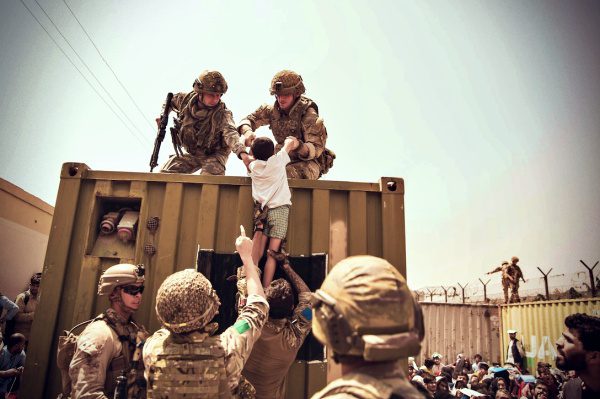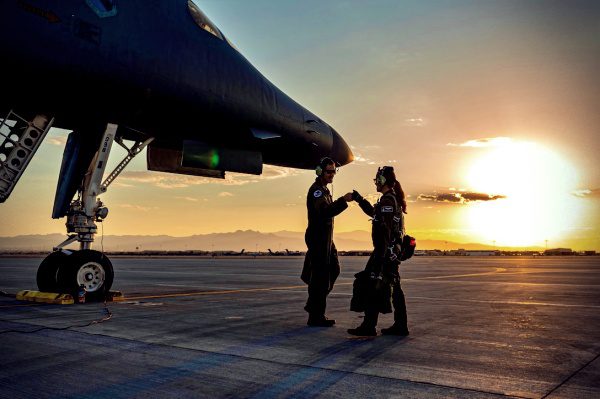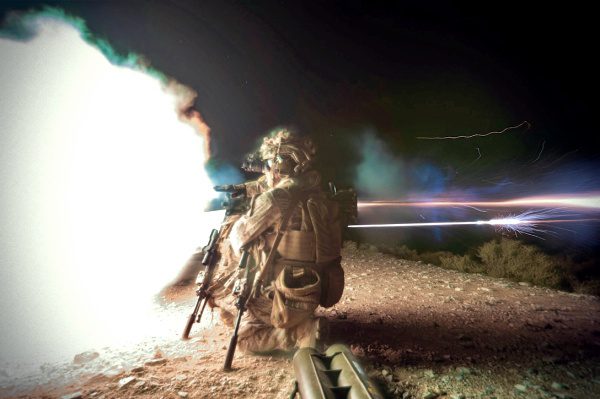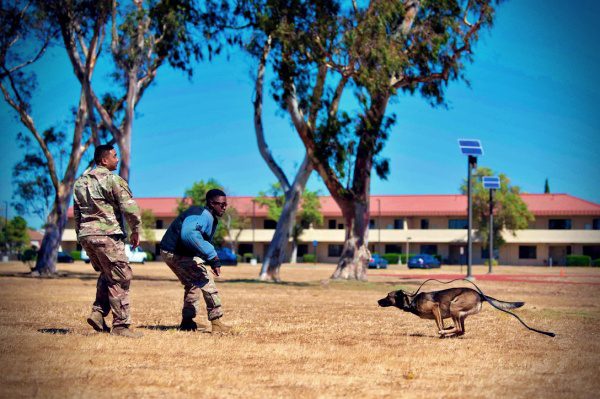At its most basic, a military court-martial is the armed forces’ version of a federal criminal trial. It’s a self-contained legal world where service members accused of breaking the Uniform Code of Military Justice (UCMJ) are prosecuted. This system exists to enforce good order and discipline—the absolute bedrock of a functioning military—and it has its own unique rules, procedures, and consequences.
A court-martial isn't just about common crimes like theft; it also covers purely military offenses that have no parallel in civilian life.
Defining the Military Court System

Let's be clear: a court-martial is a formal, adversarial trial. This isn't some casual disciplinary meeting in the commander's office. It’s a full-blown court proceeding, complete with a military judge, government prosecutors (called trial counsel), your defense counsel, and a panel of officers or enlisted members who act as the jury.
The entire system is built on the UCMJ, which is the federal law that defines crimes and procedures for the military. While the UCMJ covers felonies and misdemeanors you'd recognize anywhere, its real power comes from its ability to regulate conduct essential to military life.
The UCMJ was created to bring a single, standardized set of laws to all branches. It recognizes that military service demands things—unquestioning obedience, combat readiness, absolute integrity—that civilian life simply doesn't. This requires a separate legal system to enforce those unique standards.
This is why a service member can find themselves facing a court-martial for something that isn't a crime at all for a civilian. Think about it:
- Disobeying a lawful order (Article 92)
- Desertion (Article 85)
- Absence Without Leave or AWOL (Article 86)
- Fraternization (Article 134)
A Historical Perspective and Modern Reality
A court-martial tries service members for everything from minor infractions to the most serious felonies, like sexual assault or war crimes. But while the threat of a court-martial feels ever-present, the reality is that they have become increasingly rare.
Consider the numbers. In Fiscal Year 2022 (FY22), the entire U.S. military conducted only 1,179 general and special courts-martial. That's a massive drop from 9,907 back in FY90. For any service member being investigated by CID, OSI, NCIS, or CGIS, this trend paints a stark picture: the government doesn't go to court-martial often, but when it does, it brings its full weight to bear. You can explore the data on this trend and its implications for military justice to see just how serious these cases have become.
Because they are so rare, each court-martial is a high-stakes event. A command's decision to press forward means they are fully committed to getting a conviction. It’s a career-ending, life-altering moment, and facing it without specialized legal help from the very start is a massive gamble.
Not all courts-martial are the same. Far from it. The military justice system is a tiered world, and the seriousness of the accusation determines everything: the type of court you'll face, the potential punishment on the table, and the legal rights you have to defend yourself.
Think of it as a ladder. At the bottom rung is the Summary Court-Martial, built for minor, in-house disciplinary problems. Step up, and you're at the Special Court-Martial, which handles more serious misconduct—think of it as the military's version of a misdemeanor trial. At the very top is the General Court-Martial, the most powerful trial court in the armed forces, reserved for felony-level crimes.
Understanding these three tiers—Summary, Special, and General—is the first, most critical step in figuring out the gravity of the fight you’re in. Each level represents a massive jump in what’s at stake, from a small fine to a life sentence.
Summary Court-Martial (SCM)
The Summary Court-Martial (SCM) is the lowest and most informal military trial. It's designed to resolve minor offenses quickly, almost like a principal’s office for enlisted members. Here’s the catch: you can’t be forced into it. An accused service member can refuse an SCM and demand a "real" trial by a Special or General Court-Martial.
This is a huge strategic decision. On one hand, an SCM has very limited punishments. On the other, your rights are almost non-existent. The "court" is just a single commissioned officer, who isn't even required to be a lawyer. There's no judge and no prosecutor.
Because a conviction is still a federal conviction, and because you give up so many rights, turning down an SCM is a move that needs to be discussed carefully with an experienced military defense lawyer.
The punishments are capped, but they can still sting:
- Confinement for up to 30 days
- Forfeiture of up to two-thirds of one month's pay for one month
- Reduction to the lowest enlisted grade (E-1)
Special Court-Martial (SPCM)
This is where things get serious. A Special Court-Martial (SPCM) is the military's intermediate court, handling cases that are on par with civilian misdemeanors or lower-level felonies. A conviction here is a federal criminal conviction that will follow you for life.
An SPCM is a formal courtroom proceeding. It's presided over by a military judge, and you’ll face a panel of at least three members (the military's version of a jury). You have the absolute right to be represented by a detailed military lawyer for free, or, more importantly, to hire a civilian defense attorney of your choosing.
A Special Court-Martial is a serious federal prosecution. A conviction can result in a Bad-Conduct Discharge (BCD), which carries a lifelong stigma and can strip you of veteran's benefits and future employment opportunities.
The maximum punishments at this level are severe and life-altering:
- Confinement for up to 12 months
- Forfeiture of two-thirds of your pay per month for up to 12 months
- Reduction in rank to E-1
- A Bad-Conduct Discharge (BCD)
General Court-Martial (GCM)
This is the big one. The General Court-Martial (GCM) is the military’s highest and most powerful trial court. It has the authority to hear any offense under the UCMJ and can hand down the absolute maximum punishment allowed by law—including life in prison or, for certain offenses, the death penalty.
A GCM is only convened for the most serious crimes—think murder, rape, espionage, or desertion during wartime. Because the stakes are so high, the procedural protections are also at their peak. A military judge presides over the trial, and the panel is made up of at least five members (or twelve if the government is seeking the death penalty).
Before a case can even get to a GCM, it has to pass through a mandatory preliminary hearing called an Article 32 hearing. This functions a lot like a civilian grand jury, testing the government's evidence to see if it’s strong enough to proceed to a trial.
The potential punishments are as serious as it gets:
- Confinement for life, with or without parole
- Dishonorable Discharge or Dismissal (for officers)
- Total forfeiture of all pay and allowances
- Death penalty (in capital cases)
The differences between these courts are not just technical—they define the battlefield. The table below breaks down the key distinctions you need to understand.
Summary vs Special vs General Courts-Martial At a Glance
| Feature | Summary Court-Martial (SCM) | Special Court-Martial (SPCM) | General Court-Martial (GCM) |
|---|---|---|---|
| Severity | Lowest level; minor misconduct | Intermediate level; misdemeanors | Highest level; felonies |
| Max Confinement | 30 days | 12 months | Life or Death Penalty |
| Max Pay Forfeiture | 2/3 pay for 1 month | 2/3 pay for 12 months | All pay and allowances |
| Punitive Discharge? | No | Yes (Bad-Conduct Discharge) | Yes (Bad-Conduct, Dishonorable) |
| Presiding Official | One officer (not a lawyer) | Military Judge | Military Judge |
| Jury (Panel) | None | At least 3 members | At least 5 members |
| Lawyer Provided? | No right to a lawyer | Yes (free military lawyer) | Yes (free military lawyer) |
| Right to Hire Civilian Lawyer? | Yes | Yes | Yes |
| Preliminary Hearing? | No | No | Yes (Article 32 Hearing) |
| Federal Conviction? | Yes | Yes | Yes |
As you can see, knowing which type of court-martial you are facing is fundamental. It dictates the rules of engagement, the severity of the potential outcome, and the level of legal firepower you need to bring to the fight.
Navigating the Court Martial Process Step by Step
The path from a military investigation to a court-martial can feel like a confusing and intimidating maze. But understanding the roadmap is the first step toward taking back control. This process isn't random; it's a structured timeline governed by the UCMJ, and each phase presents critical opportunities for a skilled defense attorney to challenge the government's case, protect your rights, and build a powerful defense.
Think of it as a series of gates. The prosecution must prove its case and clear specific legal hurdles at every single one to move forward.
Investigation and Preferral of Charges
Every court-martial starts with an investigation. This is usually run by a military law enforcement agency like the Criminal Investigation Division (CID), Naval Criminal Investigative Service (NCIS), or the Air Force Office of Special Investigations (OSI). Agents gather evidence, interview witnesses, and try to question the service member they're targeting—the "subject."
CRITICAL NOTE: This is the single most important moment to get a lawyer. Anything you say to investigators can and will be twisted and used against you. Your right to remain silent is a shield, and having a lawyer present is the best way to use it.
Once the investigation wraps up, the command reviews the evidence packet. If your commander believes there’s enough evidence that a crime was committed, they will “prefer” charges. This is the military’s version of a formal accusation—a signed document listing the specific UCMJ articles you’re being accused of violating.
Article 32 Hearing and Referral
For a General Court-Martial—the most serious level—the case can't just go straight to trial. It must first go through an Article 32 preliminary hearing. This is a mandatory safeguard that works a lot like a civilian grand jury, designed to prevent baseless or malicious prosecutions from ruining a career.
A neutral Preliminary Hearing Officer (PHO) reviews the government's evidence to see if there's probable cause to believe a crime occurred and that you're the one who committed it.
This is a pivotal moment. A sharp defense lawyer can cross-examine the government's witnesses, poke holes in their story, and show the PHO just how weak the case really is. A successful Article 32 hearing can get charges thrown out, reduced, or moved to a less severe administrative forum. You can get more details on this crucial phase in our complete guide on understanding Article 32 investigations.
After the hearing, the PHO sends a recommendation to the Convening Authority—a high-ranking officer who holds the power to send your case to trial. If they decide to move forward, they "refer" the charges to a specific type of court-martial.
This chart breaks down the three tiers of military courts your case could land in.

As the diagram shows, the severity escalates dramatically from a Summary to a General Court-Martial. The tier your case is referred to dictates everything from the rules of the trial to the maximum punishment you could face.
Arraignment and Pretrial Motions
Once charges are referred, the arraignment happens. This is a short, formal court session where the charges are read to you in front of a judge and you enter your plea—almost always "not guilty." This officially kicks off the trial process.
Next comes the real fight before the trial: pretrial motions. This is where your defense attorney goes on the offensive, filing strategic legal arguments to shape the battlefield. Common motions include:
- Motions to Suppress Evidence: Arguing that investigators broke the law to get their evidence—like an illegal search of your phone or a coerced confession—and that it should be thrown out.
- Motions to Dismiss Charges: Arguing that the charges are legally defective, the court doesn't have jurisdiction, or your right to a speedy trial has been violated.
- Motions for Witnesses or Experts: Forcing the government to pay for essential defense witnesses or expert consultants—like a DNA analyst or forensic psychologist—needed to win your case.
This is a legal war fought on paper before anyone ever steps into the courtroom. Winning these motions can cripple the prosecution's case.
The Trial and Post-Trial Process
If the case proceeds, the trial itself follows a familiar rhythm:
- Panel Selection (Voir Dire): Both the prosecution (Trial Counsel) and your defense lawyer question potential court members (the military jury) to select a fair and impartial panel.
- Opening Statements: Each side lays out a roadmap of what they intend to prove.
- Presentation of Evidence: The prosecution presents its witnesses and evidence, and the defense gets to cross-examine every single one. Then, the defense presents its case.
- Closing Arguments: The lawyers for each side summarize the evidence and make their final pitch to the panel.
- Findings (The Verdict): The panel members deliberate in private and vote on whether you are guilty or not guilty.
- Sentencing: If you are found guilty, a separate mini-trial for sentencing occurs where both sides present arguments and evidence about what punishment is appropriate.
But even after the trial, it's not over. The Convening Authority must review and approve the findings and sentence. And for more serious convictions, there is an automatic appeals process where higher courts review the entire case for legal errors that may have occurred.
Understanding Your Rights in a Military Trial
A dangerous myth circulates in the barracks and on the flight line: that by joining the military, you surrender your constitutional rights. This is a lie. When you face a military trial, you are not stripped of your fundamental protections. The UCMJ and the U.S. Constitution provide a powerful shield, but you have to know how to use it.
The reality of a court-martial is that while it operates under a unique legal code, it is still an American court of law. This means you keep the core rights that are the bedrock of our entire justice system. Knowing these rights isn't just an academic exercise; it's the first and most critical step in building a defense that can protect your freedom, your career, and your future.
Your Absolute Right to an Attorney
From the moment you are suspected of a crime, you have the right to a lawyer. This is non-negotiable. Military investigators from agencies like CID, NCIS, OSI, or CGIS are highly trained in interrogation techniques designed to make you talk. Their job is to secure a confession, not to help you.
You will be offered a detailed military lawyer, known as a Judge Advocate or JAG, at no cost to you. However, you also have the absolute right to hire an experienced civilian military defense lawyer of your choosing. This is a critical distinction. A civilian attorney works only for you, free from the chain of command and any potential conflicts of interest, bringing a singular focus to your defense.
The Power to Remain Silent
Your most powerful right during an investigation is the one you can use immediately: the right to remain silent. Under Article 31 of the UCMJ, you must be informed of the charges against you and told that you do not have to make any statement. Anything you say can and will be used against you in a trial.
Invoking your right to silence is not an admission of guilt. It is a smart, strategic decision to prevent investigators from twisting your words. Your only statement should be: "I am exercising my right to remain silent and I want to speak with a lawyer."
The moment you say this, all questioning must stop. It is the single most effective way to protect yourself while you secure legal representation.
Fundamental Trial Protections
Beyond the initial investigation, your rights follow you right into the courtroom. These aren't privileges; they are guaranteed protections designed to ensure a fair trial and prevent a wrongful conviction.
Here are the key rights you possess at a military court-martial:
- Presumption of Innocence: You are presumed innocent until the government proves you guilty. The burden of proof is entirely on the prosecution.
- Proof Beyond a Reasonable Doubt: The government must prove every single element of the alleged offense beyond a reasonable doubt. This is the highest standard of proof in the legal system.
- Right to Confront Accusers: You have the right to be present at your trial and to cross-examine every witness the government brings against you. This allows your lawyer to challenge their testimony and expose inconsistencies.
- Right to Present a Defense: You have the right to call witnesses on your own behalf and present evidence that supports your innocence.
These rights form the foundation of any strong defense. For example, a skilled defense attorney can dismantle the prosecution's case by creating reasonable doubt. This might involve challenging the credibility of a key witness, presenting expert testimony that contradicts the government's theory, or proving you lacked criminal intent. In a recent case, a conviction was overturned on appeal because the prosecution’s digital evidence wasn’t sufficiently linked to the accused—a perfect example of how a defense can win by showing the government's evidence simply isn't strong enough to meet the "beyond a reasonable doubt" standard.
How a Court-Martial Differs From a Civilian Trial
While both military courts-martial and civilian trials are supposed to be about finding justice, they operate in completely different universes. Thinking a court-martial is just a civilian trial in camouflage is a dangerous—and common—mistake. The unique demands of military discipline have forged a separate legal system with its own rules, players, and power structures that have no direct parallel on the outside.
Understanding these differences isn't just an academic exercise. It's the absolute foundation of any winning defense strategy. Key distinctions in how the "jury" is picked, who holds the ultimate power, and even how appeals work make specialized military law experience non-negotiable.
The Jury Panel vs. A Jury of Your Peers
One of the most jarring differences is the jury. In a civilian courtroom, you get a "jury of your peers" pulled from the general public. In a court-martial, the jury is a panel of service members, and they are hand-picked by the Convening Authority—the very same commander who sent your case to trial in the first place.
This panel is made up of officers who outrank the accused. If you’re an enlisted member, you can request that at least one-third of the panel also be enlisted, but even those members have to be senior to you. This creates a command-heavy dynamic that feels nothing like a civilian jury box.
A military panel doesn't just decide guilt or innocence. If they convict you, that same group of officers and senior NCOs immediately turns around and decides your sentence. This is a massive departure from civilian courts, where a judge almost always handles sentencing separately, often weeks or months later.
This dual role means the panel isn't just weighing the facts. They're also laser-focused on how the outcome will impact military good order and discipline.
The Role of the Convening Authority
Perhaps the single biggest difference is the immense, almost absolute power of the Convening Authority (CA). This is a high-ranking commander who wields incredible influence over the entire process from start to finish.
The CA is the one who:
- Decides whether to send a case to trial at all.
- Personally selects the members of the jury panel.
- Holds the power to approve, reduce, or even throw out the findings and sentence after the trial is over.
This command-centric structure is a unique hallmark of the U.S. military justice system. While many of our allies are moving toward greater judicial independence, the U.S. keeps this powerful role for commanders. For example, Canada completely overhauled its system to remove convening authority from commanders, and other allied nations have made similar shifts. You can read a comprehensive review of these global court-martial systems to see just how different the U.S. model is.
Evidence Rules and Automatic Appeals
Finally, the rulebook and the endgame are totally different. The Military Rules of Evidence (MRE) are based on the federal rules, but they contain unique, military-specific provisions that can make or break a case.
Even more distinct is what happens after a conviction. In a civilian case, the defendant has to take active steps to file an appeal. In the military, any conviction that includes a punitive discharge or confinement for two years or more automatically triggers an appellate review. This is a built-in safeguard, but it also shows just how seriously the system views the life-altering consequences of a court-martial conviction. You can learn more by exploring the key differences between UCMJ and civilian cases in our detailed article.
The Aftermath of a Court-Martial Verdict

The moment the panel president reads the findings, your entire world hangs in the balance. It’s a fork in the road. An acquittal means you walk out with your name cleared, career intact, and your life back. But a conviction isn’t just a loss; it’s the start of a whole new fight.
That verdict triggers a cascade of consequences that reach far beyond the courtroom walls. This isn't the end. For many, it's the beginning of a harsh new reality, underscoring why an aggressive, all-in defense from day one is absolutely non-negotiable.
If you are found guilty, the trial immediately shifts into the sentencing phase. This is where the panel or military judge decides your punishment, turning abstract legal threats into a concrete reality that can strip away everything you’ve worked for.
Direct Punishments and Sentences
The menu of punishments is broad, driven entirely by the seriousness of the charge and the type of court-martial. For most service members who are convicted, the sentence is a combination of several life-altering penalties handed down at once.
Common sentences include:
- Confinement: This can mean anything from a few months in a local brig to decades in a maximum-security military prison like the U.S. Disciplinary Barracks at Fort Leavenworth.
- Forfeiture of Pay and Allowances: The court can order you to forfeit all or part of your monthly pay, instantly crippling your family’s financial stability.
- Reduction in Rank: Being busted down to E-1 is a common and humiliating punishment. It erases years of promotions and hard-earned respect in a single moment.
- Punitive Discharge: This is the career-killer. A Bad-Conduct Discharge (BCD) or a Dishonorable Discharge (DD) brands you for life and slams the door on virtually all veterans' benefits.
These punishments aren’t separate; they’re designed to work together to have a devastating impact. You can get a much clearer picture of how these penalties are stacked by reading our guide on understanding sentencing in military court martial cases.
The Lifelong Collateral Consequences
The formal sentence is just the tip of the iceberg. The hidden, long-term consequences of a court-martial conviction are what create permanent barriers to a normal life after the military. This is the "aftermath" that most service members are completely unprepared for.
A conviction at a special or general court-martial is a federal criminal conviction. This record follows you everywhere, showing up on background checks for jobs, housing, and professional licenses for the rest of your life.
These downstream effects are brutal. For certain offenses, especially those under Article 120, a conviction often carries a mandatory requirement to register as a sex offender, which means public notification and strict lifelong monitoring.
Then there’s the punitive discharge, which usually means the total loss of VA home loan eligibility, G.I. Bill educational benefits, and access to VA healthcare. Even if you avoid a punitive discharge, the conviction itself can make it nearly impossible to land a decent job in the civilian world. The combination of a federal conviction and a tainted military record creates a stigma that is incredibly difficult to shake.
The message is clear: the consequences of a guilty verdict are total and life-altering. That makes a powerful, expert defense not just an option, but a necessity.
When you’re staring down the barrel of a potential court-martial, the flood of questions can feel overwhelming. Service members and their families are thrown into a world of uncertainty, desperate for straight answers about the military justice system. This section cuts through the noise to give you direct, clear answers to the most common concerns we hear every day.
Getting a handle on your rights and your options is the first step. It's how you start building a defense and fighting for your future.
Can I Refuse an Article 15 and Demand a Court-Martial?
Yes, you can. When a commander offers you non-judicial punishment (NJP) under Article 15, you absolutely have the right to turn it down and demand a trial by court-martial. But be warned: this is a high-stakes, strategic decision.
Refusing an NJP escalates things—fast. While your command could just drop the whole thing, it’s far more likely they’ll double down and take you to a Special Court-Martial. There, the punishments are life-altering, including a federal conviction and a Bad-Conduct Discharge.
However, if the government’s case is flimsy, demanding a trial forces their hand. They have to prove their case beyond a reasonable doubt, a much, much higher bar than the one for NJP.
This is a strategic gamble you should never make without talking to an experienced military defense attorney. They can dissect the evidence, size up the command, and help you weigh the risks of a trial against the certainty of accepting punishment.
Should I Hire a Civilian Lawyer If I Already Get a Free Military Lawyer?
While the military provides you with a detailed JAG for free, you always have the right to hire a civilian attorney. The difference often comes down to one thing: focus.
Your assigned JAG is likely a dedicated officer, but they are almost always buried under a mountain of cases. That reality limits how much time and energy they can pour into any single defense.
A private civilian defense firm, on the other hand, works for one person: you. They exist completely outside the military command structure, so there’s no risk of institutional pressure or conflicts of interest. This independence allows for a singular focus on your case, backed by the resources to fund independent investigations and bring in world-class experts.
For a career-ending charge, that level of personalized attention isn't a luxury—it's often the key to winning.
What’s the First Thing I Should Do If I Am Under Investigation?
The moment you find out you’re a suspect in an investigation by CID, NCIS, OSI, or CGIS, your next moves are everything. You need to follow this two-step emergency plan without hesitation:
- Politely invoke your rights. When investigators try to question you, there is only one correct response: "I am exercising my right to remain silent and I want to speak to an attorney." Say nothing else.
- Call a qualified military defense lawyer immediately. Do not talk to anyone about the situation—not your command, not your buddies, and definitely not investigators—until you have a lawyer. Every word you say can and will be twisted and used against you.
Are Courts-Martial Open to the Public?
Yes, courts-martial are almost always open to the public, just like trials in the civilian world. This means your family, friends, and even the press can attend.
Having your family and supporters in that courtroom does more than just provide emotional support. It sends a powerful, unspoken message to the jury panel that you are a valued person with a community behind you—not just another name on a charge sheet.
If you're under investigation or facing a court-martial, the stakes are too high to navigate this alone. The attorneys at Gonzalez & Waddington have built a reputation on aggressive, strategic defense that protects careers, freedom, and futures. Contact us today for a confidential consultation.








